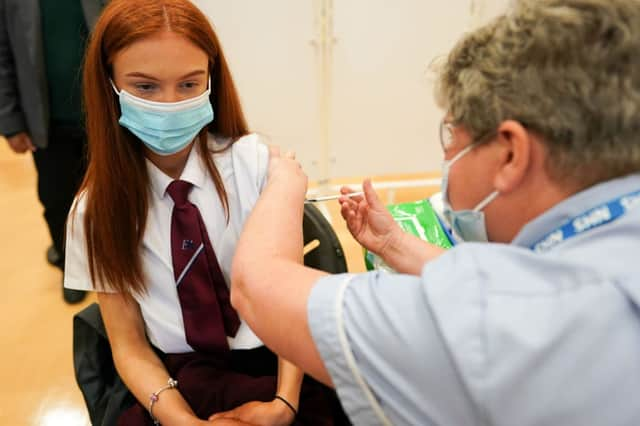Giving kids second jab could prevent thousands of long Covid cases


Giving children two doses of a coronavirus vaccine could help to prevent thousands of cases of long Covid, new research suggests.
The findings come as children aged between 12 and 15 are now eligible to receive one dose of the Pfizer Covid-19 vaccine, although it is yet to be recommended that young people be given a second jab.
What did researchers find?
Advertisement
Hide AdAdvertisement
Hide AdThe new study, published in the Journal of the Royal Society of Medicine, saw researchers conduct a risk/benefit analysis of teens aged between 12 and 17 getting two doses of the vaccine.
Researchers used historic rates of hospital admissions, intensive care support and death among children in England who had Covid-19 to conduct the analysis, and examined estimates of long Covid.
The study also assessed vaccine efficacy rates and the potential risk of heart inflammation linked to the jab.
Findings from the research suggest that the benefits of giving young people a second dose outweigh the risks “unless case rates are sustainably low”.
‘Benefits outweighs the risk’
Advertisement
Hide AdAdvertisement
Hide AdAs of September 15, around 680 out of every 100,000 youngsters aged between 10 and 19 were catching Covid-19 every week.
If this increases to 1,000 cases per week over a 16-week period, it is estimated that giving 12 to 17-year-olds two vaccine doses will avert 4,430 hospital admissions and 36 deaths over a period of 16 weeks.
If cases drop to just 50 per week, double vaccination could avert 70 hospital admissions and two deaths over the course of 16 weeks.
The study states: “The benefit of vaccination in terms of hospitalisations in adolescents outweighs risks unless case rates are sustainably very low (below 30/100,000 teenagers/week).
Advertisement
Hide AdAdvertisement
Hide Ad“Given the current high case rates in England, our findings support vaccination of adolescents against SARS-CoV2.”
Long Covid cases could be reduced
The study also suggests that thousands of potential cases of long Covid could be averted by offering young people two doses of a coronavirus vaccine.
Researchers made estimates based on different assumed rates of long Covid, from an estimate that 14% of children have prolonged symptoms after infection to 2% of children suffering continuing symptoms.
The authors said that vaccination could “avert 56,000, 16,000, or 8,000 cases in 12 to 17-year-olds assuming incidence rates of 14%, 4%, and 2% respectively.”
Advertisement
Hide AdAdvertisement
Hide AdOn Tuesday (28 September), data from a small study of schools in England suggested that more than one in 10 secondary school pupils have suffered ongoing symptoms after a coronavirus infection.
The survey from the Office for National Statistics (ONS) estimates that 12.3% of secondary school pupils with a previously confirmed Covid-19 infection reported experiencing ongoing symptoms more than four weeks from the start of the infection.
Some 9.4% said their ability to carry out day-to-day activities had been significantly reduced.
Lead author, Dr Deepti Gurdasani, of Queen Mary University of London, said: “This analysis shows that, on clinical risks alone, vaccination is warranted for 12 to 17-year-olds in England.
Advertisement
Hide AdAdvertisement
Hide Ad“While we wait to understand the long-term effects of Covid-19 on children, the precautionary principle advocates for protecting all children from exposure to this virus and vaccination is a crucial part of that protection.”
The authors of the latest research also examined the potential complication of heart inflammation among a small number of young people who had received the vaccine, but said the cases were “rare” and a “typically mild complication”.
The study concluded: “Our conservative analysis shows that the benefits of offering two doses of vaccine to all 12 to 17-year-olds clearly outweigh the risks to the children concerned in both the current context and in scenarios with substantially lower case incidence rates.
“The real-world short-term risks from vaccination in over 12 million under-18s who have been vaccinated around the world have been found to be minimal, with myocarditis being a rare, and typically mild complication.”
This article originally appeared on our sister site, NationalWorld.